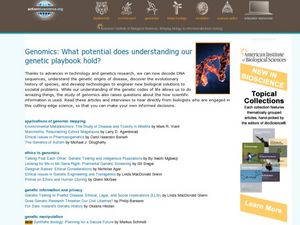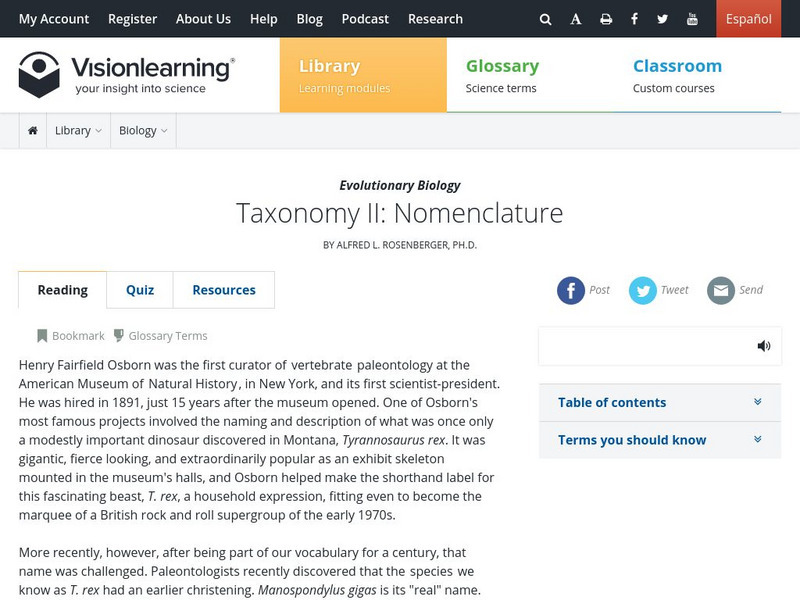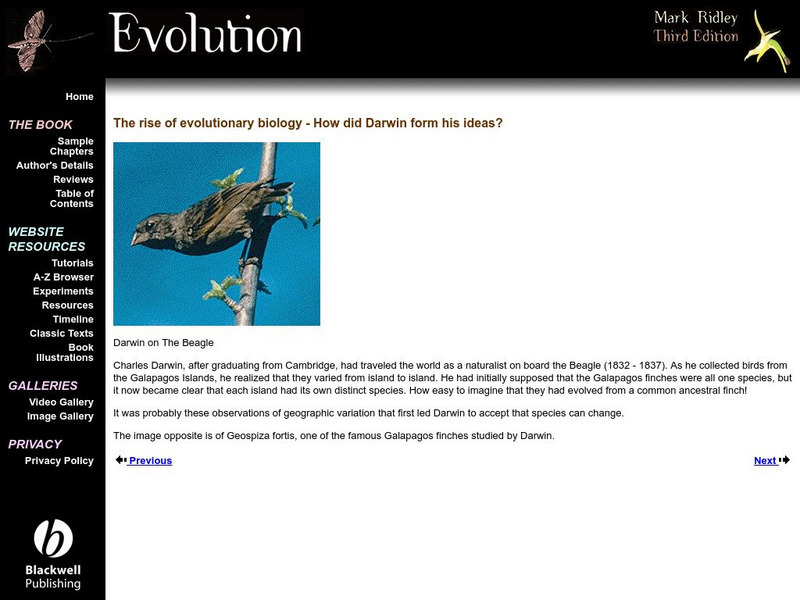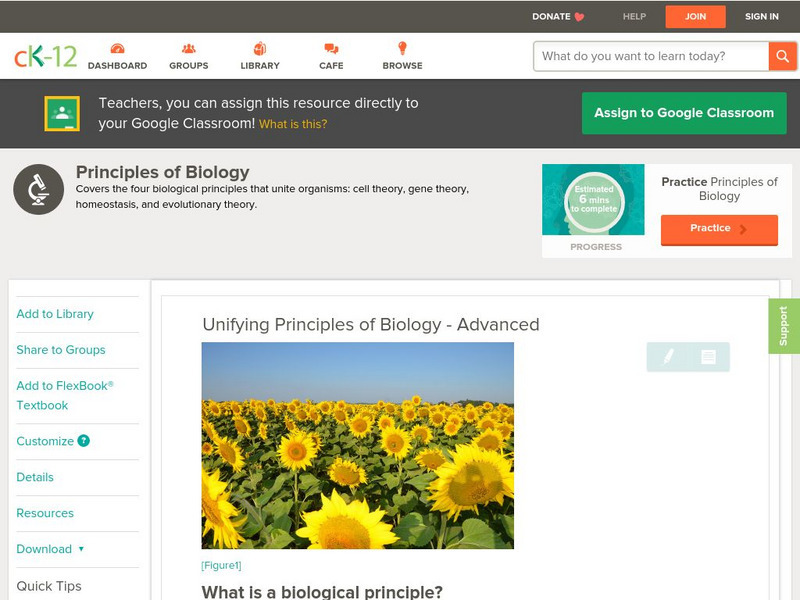Curated OER
Natural Selection
Young scholars practice calculating allele and genotype frequencies in the framework of a simple simulation using hard candy, calculators, and a worksheet. This lesson includes a three-page worksheet and an assessment question for...
Curated OER
Exploring Organisms
Students investigate various organisms in an attempt to understand the process of evolution and related ecological issues. This elementary instructional activity uses small plastic animals and includes a worksheet for student assessment...
Curated OER
How Science Works: Natural Selection
Students are introduced to the topic of adaptation and discuss how various animals adapt to their environment. In groups, they participate in a simulation in which they are selected based on criteria. They discuss the results and relate...
Curated OER
Issues in Genomics
Students explore the definition of ethics and genomics. In this organism lesson students participate in the chosen teacher lesson.
Curated OER
Why Care About Amphibian Population Decline and Malformations?
Young scholars examine the reasons for preserving wildlife. They look at reasons for amphibian malformations and write an essay about the ethical issues that this brings up. They listen to the teacher read quotes about extinction and how...
Georgia Department of Education
Ga Virtual Learning: Ap Biology: Evolutionary Biology
Through informational text, interactive activities, animations, and video clips, students investigate evolutionary biology.
Vision Learning
Visionlearning: Evolutionary Biology: Taxonomy: Nomenclature
An explanation of how living organisms are named and the importance of naming them accurately.
Vision Learning
Visionlearning: Evolutionary Biology: Origins of Life: Early Ideas
An explanation of how life came into existence from early beliefs, such as panspermia, to more recent ideas like abiogenesis.
Encyclopedia of Earth
Encyclopedia of Earth: Evolutionary Biology: Evolution in Action
Scientific article discussing the evolutionary processes involved when an insect species splits into two other distinct species. (Published: February 28, 2011)
Talk Origins Archive
Talk.origins: Introduction to Evolutionary Biology
An article giving a brief introduction to evolutionary biology. The article addresses misconceptions as well as the basics of the theory of evolution.
National Health Museum
Access Excellence: Molecular Biology/primate Phylogeny
This lesson plan involves comparison of amino acids to create a phylogenetic tree of primates. Students will also use other species information to draw conclusions about evolutionary relationships.
Other
The Rise of Evolutionary Biology: Biology Before Darwin
These pages are part of a site called "Evolution," that accompanies a textbook by the same name. Mark Ridley is the author. Here he discusses theories for species change that were before Darwin published "On the Origin of Species."
Howard Hughes Medical Institute
Hhmi: Bio Interactive: Lizard Evolution Virtual Lab
Students explore the evolution of the anole lizard in this virtual lab. Students will collect and analyze data during the virtual lab that focuses on evolutionary biology and includes adaptation, convergent evolution, phylogenetic...
Untamed Science
Untamed Science: Biology: Evolution: History of Life: The Cambrian Explosion
Learn about the Earth's evolutionary history during the Cambrian period. [3:25]
Georgia Department of Education
Ga Virtual Learning: Ap Biology: Cell Biology
An interactive module where students take a closer look at cells and relate their structure to function. They also discover how cell organelles work in systems to maintain important biological processes and how cells communicate.
Georgia Department of Education
Ga Virtual Learning: Biology: Evolution
Through informational text, online lab activities, virtual simulations, and video clips, students study the concepts of biological evolution.
Famous Scientists
Famous Scientists: Theodosius Dobzhansky
Read a short biography about Theodosius Dobzhansky, a central figure in the field of evolutionary biology for his work in shaping the unifying modern evolutionary synthesis.
Other
The Rise of Evolutionary Biology: Darwin's Ideas
These pages are part of a site called "Evolution," that accompany a textbook by the same name. Mark Ridley is the author. This section is about Darwin, his travels, and his observations that led to "On The Origins Of Species."
CK-12 Foundation
Ck 12: Biology: Principles of Biology
[Free Registration/Login may be required to access all resource tools.] Covers four unifying principles of biology: cell theory, gene theory, homeostasis, and evolutionary theory.
CK-12 Foundation
Ck 12: Biology: Biogeography
Discusses how biogeography relates to evolutionary changes. [Free Registration/Login may be required to access all resource tools.]
Encyclopedia of Earth
Encyclopedia of Earth: Evolutionary Biology: Pleistocene
Article describing the Pleistocene Epoch, which lasted from 1.8 million to about 10,000 years ago. It discusses species that lived then (e.g., the mammoth), and the climate changes that took place at that time. (Published: May 8, 2010)
Encyclopedia of Earth
Encyclopedia of Earth: Evolutionary Biology: Organism
Article explaining what organisms are, their cellular foundation, and how they get their energy and nutrition. (Published: May 26, 2010)
Encyclopedia of Earth
Encyclopedia of Earth: Evolutionary Biology: Symbiosis
Article describes the different types of symbiosis, some of which are of mutual benefit, and others not. It also explains the differences between endosymbiosis and exosymbiosis, where one organism lives either inside or else upon the...
Encyclopedia of Earth
Encyclopedia of Earth: Evolutionary Biology: Mammal
Article explaining the basic characteristics of mammals, their diet, reproduction, behavior, conservation concerns, taxonomy, and their evolution. (Published: September 23, 2010)





















